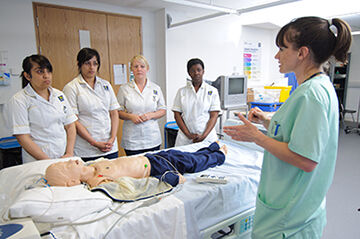University News Last updated 14 November 2018

Student nurses in Birmingham will be given a number of specialist training sessions focusing on how to prevent pressure ulcers, to mark Worldwide Pressure Ulcer Prevention Day (Thursday 15 November).
Birmingham City University is marking the day to help raise awareness of the problems presented by pressure ulcers and to support the NHS Improve campaign ‘Stop The Pressure’.
The sessions will be open to student nurses and will raise awareness of prevention techniques, risk factors and how pressure ulcers impact upon patients’ quality of life.
Up to 200,000 people develop pressure ulcers each year1, which are painful and distressing for patients and lead to longer hospital stays. Treatment of pressure ulcers costs the NHS approximately £1.4 million per day2.
Birmingham City University academic Alisen Dube is leading research in collaboration with University Hospitals Coventry and Warwickshire NHS Trust.
The research aims to identify important factors that contribute to the development of heel pressure ulcers, the second most common ulcer location, and to understand their impact on quality of life and whether these ulcers are part of skin changes at different stages of life.
The University is hoping its research and expertise can help it to raise awareness of the condition and train the next generation of medical professionals in how to prevent pressure ulcers.
David Gray, Professor of Wound Healing at Birmingham City University, said: “As the region’s biggest provider of nursing education with extensive offerings in wound care, the university is well placed to undertake this research.
Ruth May, Executive Director of Nursing at NHS Improvement, said: “We’ve made great progress through the campaign in supporting nursing, allied health professions and clinical staff in the NHS with tools and collaborative programmes focussed on prevention and effective diagnosis, measurement and treatment of pressure ulcers.
“By focusing on more effective ways to prevent pressure damage, we can help keep patients free from pain with reduced complications, meaning we can often reduce the time they have to spend in our care, which benefits patients and the health service alike. We want everyone to join us as we aim to ‘Stop The Pressure’.”